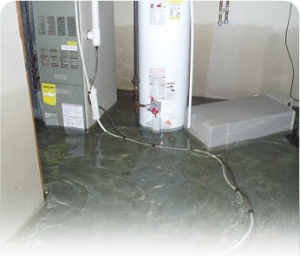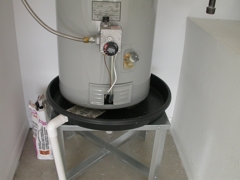 There is no doubt that hot water heater leaks or over-flows will can result in substantial damage to your home, however even a hot water heating system pipe dripping or leaks slowly will trigger significant hot water damage with time. As the water becomes absorbed into the particle board and swells, it causes the floor to rot and decay. Additionally, the seemingly small water heater over-flow leakage might result in hot water heater flooding and will eventually cause mold or mildew in carpets as well as completely stained walls.
There is no doubt that hot water heater leaks or over-flows will can result in substantial damage to your home, however even a hot water heating system pipe dripping or leaks slowly will trigger significant hot water damage with time. As the water becomes absorbed into the particle board and swells, it causes the floor to rot and decay. Additionally, the seemingly small water heater over-flow leakage might result in hot water heater flooding and will eventually cause mold or mildew in carpets as well as completely stained walls.
Reasons for Leaks
The life span of many water heating systems is around 8 – 15 years. So, water heating unit leakages and over-flows are simply a matter of time for many people. There are various reasons for hot water heater damage and ending up flooding, so the best and most basic solution is to try and prevent extensive water damage in the first place. Proper maintenance of your water heating system pipes, water heating unit over-flow pan, and hot water heating unit overflow valves is incredibly vital, given the capacity of water heater tank over-flows to cause a lot water damage. Regular preventative upkeep could ward off water heater leakages and the resulting extensive, expensive repairs.
All hot water heater pipes and valves need to be looked for leakages and drips frequently. Also, see to it to inspect below the hot water heater, in case corrosion and rust have eaten away at the bottom of the tank. Continuous water heater leaking into the water heating system overflow pan might be caused by deterioration and sediment build up inside the tank. Occasionally dumping out some water from the spout at the lower part of the hot water heating system should take care of the sediment and minimize deterioration. Prior to performing this procedure, you should shut down your gas or electric power and wait for your water to cool a bit. Likewise, switch off the valve for incoming water and drain water into a container or toward the outside of your property.
The pressure/temperature valve on your hot water heating unit is a safety function to discharge hot water if the temperature level and pressure in the water tank become too high. When the valve is not working correctly, the hot water heating unit tank may burst. Since water heating system valves may be defective or old and could leakage, a routine check could expose any such trouble before it gets out of hand and triggers hot water heater overflow valve leaky. As you inspect the valve, bear in mind that the water inside the tank is hot and may trigger serious burns. When you pull-up or push down on the valve and hot water comes out from the overflow pipe, the valve works as designed.
Prevention Steps.

a water heating system in a drip pan full of water
As soon as you establish a good maintenance schedule in your hot water heater and routinely examine hot water heater over-flow pipes leakages, you should have the ability to avoid most water heater leakages and floods. Still, you could wish to be proactive and go a step further.
Make sure you have a water heater overflow pan beneath your tank. They are inexpensive and usually are a good investment decision in case of water heater overflows and leaking plumbing. The water heater pan need to obtain water and avoid moisture problems by draining water out.
An extra step you may decide to take if you have actually particleboard below and around your water heater, would be to eliminate it and install ply-wood rather. Particle-board can be quickly damaged with water, however ply-wood is more resistant. You might likewise wish to utilize a water sealer on the floor below the water heater tank to protect the area from the possible water damage in case of a water heater pipe bursting, dripping or leaks. When you decide to take this step, kindly make sure to turn off your gas or electric power to reduced a fire danger.
Exactly what to do if you identify a water heater overflow.
Often, you will be able to identify a hot water heater overflow at its early stages. If this happens, you can take immediate action and contain the water damage before calling for assistance. These are the fundamental steps:.
- Use appropriate clothing – Make sure to wear rubber boots, gloves and safety glasses. If water is gushing out from the heater, wear a vest or a raincoat for an additional layer of protection.
- Review the area carefully – Make sure that the water on your floor isn’t hot enough to scaldyou. A space full of steam is a warning. Make sure there is good visibility and inspect very carefully for power outlets or electrical cable connections that could have been submerged to prevent the possibility of getting shocked.
- Shut off the water supply – Look for the cold water pipes that feeds water to the heater. It must be the water line that comes from the primary water line and goes to the top of the heating holding chamber. Search for the valve that controls flow of water and turn it clockwise until it will not twist anymore. Typically, the water supply shuts itself off when the tank is full, however considering that a leak leads to a tank that never ever fills up, the water will continue running up until it’s manually turned off.
- Turn off the heating ASAP – If the water over-flow is caused by a malfunctioning thermostat, the hot water isn’t the only thing you ought to be worried about. The heating element will not shut itself down, making it waste energy and even potentially initiate a fire. As the property owner, you should know exactly what powers your heating unit: electrical power or natural gas. If your heater runs on electrical power, go to your circuit breaker panel and flip the switch that feeds power to the heater. If you use gas, turned off the gas line that provides the heating unit. If you smell the odor of gas, ensure to get everybody out of our home until the air is cleared.
- Document the event – Take photos of parts of your home and its furnishings that might have been damaged by water. Remember on what happened as you remember the occasions. This will contribute in submitting a successful insurance claim.
- Require professional water damage cleanup services – water damage can be a nightmare to contend with after a hot water heater overflow. If done incorrectly, it leaves behind a musty odor and it can completely damage your house structure building and the items in it. Bacteria and fungi can likewise fester and posture a threat to your house residents.
To schedule Water Heater Leaks and Overflows Inspection appointment, call 732-722-5211 or click here
